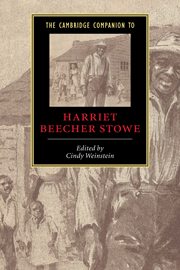Book contents
- Frontmatter
- Introduction
- 1 Stowe and race
- 2 Uncle Tom’s Cabin and the south
- 3 Uncle Tom’s Cabin and the American Renaissance
- 4 Reading and children:Uncle Tom’s Cabin and The Pearl of Orr’s Island
- 5 Uncle Tom and Harriet Beecher Stowe in England
- 6 Staging black insurrection: Dred on stage
- 7 Stowe and regionalism
- 8 Stowe and the law
- 9 Harriet Beecher Stowe and the American reform tradition
- 10 Harriet Beecher Stowe and the dream of the great American novel
- 11 Stowe and the literature of social change
- 12 The afterlife of Uncle Tom’s Cabin
- Select bibliography
- Index
- Series List
7 - Stowe and regionalism
Published online by Cambridge University Press: 28 May 2006
- Frontmatter
- Introduction
- 1 Stowe and race
- 2 Uncle Tom’s Cabin and the south
- 3 Uncle Tom’s Cabin and the American Renaissance
- 4 Reading and children:Uncle Tom’s Cabin and The Pearl of Orr’s Island
- 5 Uncle Tom and Harriet Beecher Stowe in England
- 6 Staging black insurrection: Dred on stage
- 7 Stowe and regionalism
- 8 Stowe and the law
- 9 Harriet Beecher Stowe and the American reform tradition
- 10 Harriet Beecher Stowe and the dream of the great American novel
- 11 Stowe and the literature of social change
- 12 The afterlife of Uncle Tom’s Cabin
- Select bibliography
- Index
- Series List
Summary
Before readers can begin to address the general question of Harriet Beecher Stowe's relation to regionalism, the category itself requires an introduction. Certainly Stowe wrote “regional” fiction throughout her writing life, even in Uncle Tom's Cabin, if in using that adjective we mean to highlight the way she locates her fiction in geographical places. However, literary regionalism from its origins in the nineteenth century does more than name place; it also locates the social and cultural perspectives of the regional characters who live and speak in its pages in ways these characters would recognize as their own, and it does so without holding them up to ridicule or allowing them to serve as yardsticks of the queer which then enable readers outside the place or from urban centers to assert the measure of their own normality.
Critics and literary historians have described a variety of fictional modes that depicted regional characters in the nineteenth century. The “humorists of the Old Southwest” began writing as early as 1831 for the sporting magazine, Spirit of the Times, in imitation ofWashington Irving’s “The Legend of Sleepy Hollow.” However, in the works of these humorists, written for an audience of “the wealthy slaveholding sportsmen and their friends and allies,” narrators encourage readers to derive “humor” from cruelty to characters in the tales, especially to white women, Negroes, lower-class white men, and sometimes animals, especially horses. While regionalism may contain elements of humor, which we find as early as the young Harriet Beecher’s first significant fiction, her 1834 “A New England sketch” (later renamed “Uncle Lot”), Stowe is clearly suggesting an alternative to the kind of literary regional material characteristic of the “humorists of the Old Southwest.” In Stowe’s work, and later in the work of regionalists more generally, regional characters receive respectful and even empathic treatment, and narrators do not earn humor at their characters’ expense.
- Type
- Chapter
- Information
- The Cambridge Companion to Harriet Beecher Stowe , pp. 131 - 153Publisher: Cambridge University PressPrint publication year: 2004
- 11
- Cited by



